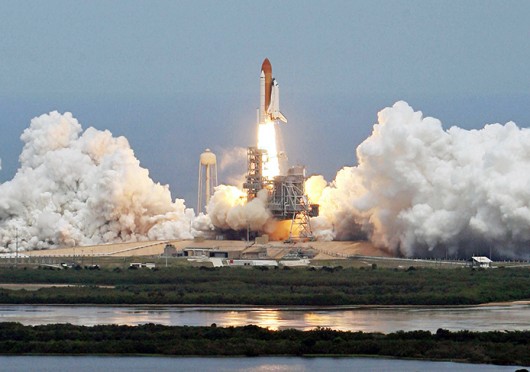
Space Shuttle Atlantis with a crew of seven astronauts blasts off May 11, 2009, on a mission to refurbish and restore the Hubble Telescope. Credit: Courtesy of MCT
Fact: the universe is an awfully big place.
In recent international space exploration news, the Indian Space Research Organisation has sent an orbiter to Mars, NASA has sent MAVEN, another Mars orbiter, NASA’s Curiosity, the Mars rover, continues to roam the surface, and the International Space Station and Hubble Telescope seem to consistently release photos and updates from ongoing missions.
I was raised with the science of outer space all around me, between the countless Discovery Channel specials my family would watch, astronomy and science fiction books stuffed side-by-side in bookshelves around the house or the conversations with my father, the engineer, whom I usually bombarded with questions. So my fascination with outer space and its scientific study has been with me since a very young age.
There is no doubt that NASA, along with other space programs around the world, has done extraordinary things in the past: sending orbiters to planets in our solar system, rovers on the surface of Mars, men on the moon, countless technological innovations and the Voyager probe that plunges into the dark depths of the unknown.
It is for these great strides that not only NASA, but also every global space agency should continue to be funded and continue to explore and be curious with no limits to this curiosity in sight.
However, I believe the presence of pressing astronomical issues is actually not the basis for space exploration. Yes, there is a possibility that in the future, an asteroid could strike Earth and mankind might have to colonize on another planet after we’ve sucked Earth dry of its life-sustaining elements. It is also important to find the presence of life and intelligence on other planetary bodies, but I think space exploration is necessary for other, more tangible reasons that don’t feel so far off in the distant future to the point of pointlessness.
A society with an ingrained mindset of curiosity is encouraging innovation, emphasizing problem solving and inspiring new ways of thinking.
A society like this one doesn’t just produce people who will figure out which planet to inhabit next; this society will figure out how we can sustain life on Earth over time and solve other Earthly issues through the study of astronomical phenomena.
For instance, the probing of Venus’ extreme atmospheric conditions have led to new insights about the validity of global warming, the greenhouse effect and the future of Earth’s atmosphere.
Scientific development and application is just part of the essence of space exploration.
NASA, along with other organizations, encourages young people to search for not only scientific answers, but also greater reason and purpose.
Fact: the universe is an awfully big place, and it is discoverable.


